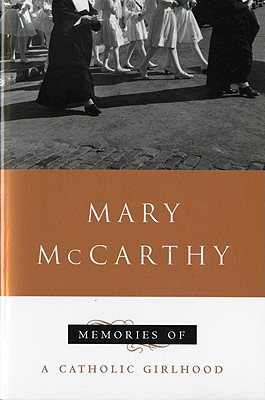

 |

|

The average rating for Memories of a Catholic girlhood based on 2 reviews is 4.5 stars.
Review # 1 was written on 2013-10-20 00:00:00 Martin Rizzo Martin RizzoOverall, Memories of a Catholic Girlhood presents interesting snapshots of a child, then young adult's life being raised by relatives after the death of her parents. An odd upbringing, but obviously, the only one she has to compare to in her life. Mary McCarthy was only six years old when her parents decided to move from Seattle (home of her mother's parents) to Minneapolis (home of her father's). On the train trip, the entire family became ill with the flu and Mary's parents died. This began her odyssey in search of herself and her place in her family/families. The story is presented in somewhat fictionalized flashbacks, especially of the early years, based on her memories, with afterwords of corroborations or corrections of some details that arise out of discussions with her brothers with whom she shared the early years in Minneapolis. The years in Seattle are all from Mary's memory and have only her editorial oversight as the boys were left behind by her grandfather Preston in Minnesota and she did not see them again for years. The title is, in some regards, a misnomer, as Mary fights off the Catholic title early on though it appears to still be part of her. She describes the daily school routines of convent school before transferring to an Episcopalian High School with her Grandfather's agreement. She becomes a very young atheist, adept at manipulating the various systems in which she must live, be it the Preston household, the convent school, the new high school or, apparently, adult life. I liked the sections where she steps back from the stories and assesses what she has written with an authorial eye a bit less passionately. I think these sections help to make the whole gel more completely and make more sense when we do realize the youth of the original narrator. This is an interesting memoir, speaking of a long gone era but of some things that still occur today, unfortunately. It has much to offer the right reader. An ecopy of this book was provided by NetGalley. |
Review # 2 was written on 2008-05-23 00:00:00 Olivier Dupre Olivier DupreReread I first read this book in the early ‘80s in a university course on autobiography. We read works that traced the history of the genre and ended with this book. I remember reading Rousseau and enjoying him immensely, but I remember this most of all, perhaps because I was young and it spoke to some of my own experiences. The only paper we wrote for the class was our own ‘autobiography’. Though I no longer have the paper (that’s another story), I remember it distinctly. Each of my siblings (I have five) was the focus of a ‘chapter’ and the professor commented negatively on only one, saying I hadn’t captured one brother as I had the others: I agree; he’s always been the slipperiest. Earlier this month, after telling a friend the details of a project I’m working on and how I planned on connecting some fictional sections I’d written with nonfictional bits, she recommended I reread this. I took her advice and was startled at how I had ‘stolen’ some of McCarthy’s technique. Did I pull out this method from somewhere deep in the recesses of my mind? Who knows? I couldn’t begin to figure out how many books I’ve read or how many may have influenced me in one way or another. Of course it’s not an exact theft: for only one difference, McCarthy sticks with first-person throughout; even though afterward she explains what’s fictional, that is, what’s not an exact memory. Times have changed since McCarthy wrote this, so her memoirs (first published in magazines and then incorporated into this book) are not as controversial as they would be now. Times have also not changed. In the opening chapter ‘To the Reader,’ I am struck by the similarity of the hate mail McCarthy received to a type of online commenting of today. The “scurrilous” letters from lay readers, mostly women, (she says the priests and nuns who wrote to her were always gracious) were so similar, she says, they could’ve been written by one person: “frequently full of misspellings,” though the person claimed to be educated; “all, without exception, menacing”; “they attempt to constitute themselves a pressure group”; one even says she is sure what McCarthy has written is illegal. Since I read this for a different reason than I usually read a book, I’m finding it hard to review. Last night I happened to see a stray review of McCarthy with a low rating that just said “she’s no role model.” I feel that’s missing the point; but, if one wants to judge a work that way, I say this is an honest, brave, true-to- herself, well-written account—and we can all aspire to that. |
CAN'T FIND WHAT YOU'RE LOOKING FOR? CLICK HERE!!!